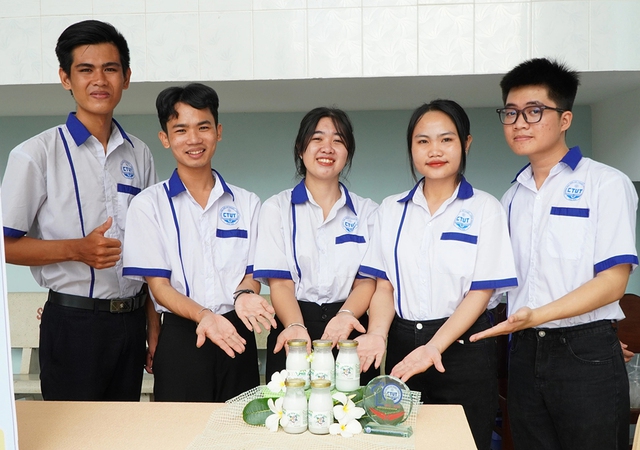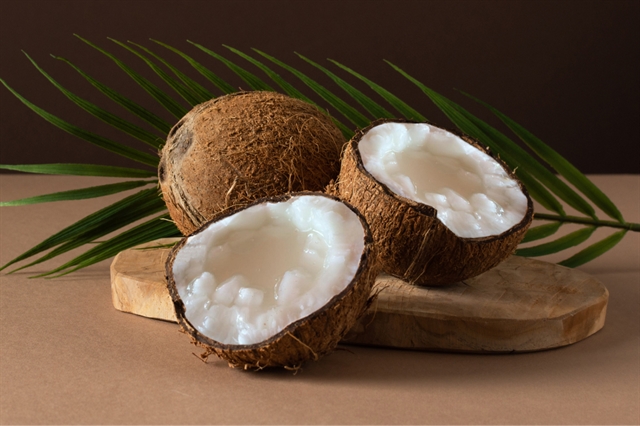 Society
Society

 |
| The group of students from the Cần Thơ University of Technology and Engineering create a beverage from Macapuno. — Photo doanthanhnien.vn |
CẦN THƠ CITY — A beverage made from Macapuno is the innovative creation of a group of students from the Cần Thơ University of Technology and Engineering.
The student group of Lâm Chí Trường, Huỳnh Văn Mến, Nguyễn Thúy Ngân, Nguyễn Huỳnh Bảo Trân, Lê Thanh Tiến, and Triệu Thị Hoàng Nhung has completed the final stages of developing the Macapuno milk.
The beverage is conveniently packaged in 200ml glass bottles, offering a tasty and nutritious option.
According to team leader Lâm Chí Trường Macapuno coconuts are a specialty of Trà Vinh Province, particularly in Cầu Kè District.
From a bunch of around ten coconuts, only two to three typically produce the jelly-like flesh characteristic of Macapuno. The soft, sticky texture of the flesh, along with its mildly fragrant and unique taste, has inspired numerous culinary start-ups.
 |
| Mâcapuno also called coconut sport is a speciality of southern Trà Vinh Province. — Photo https://ngkt.mofa.gov.vn |
Macapuno is one of the high-value crops in several southern provinces. Historically, they were not cultivated on a large scale due to their low yield of jelly-containing fruits, which amounts to only 20 per cent of the total number of fruits on a tree.
Statistics indicate that Cầu Kè District alone is home to over 15,000 Macapuno trees, of which approximately 6,000 are fruit-bearing.
These trees yield between 40 and 80 fruits per year.
Depending on the season, each coconut sells for VNĐ57,000–128,000 (US$2.33–5.23), a price 10 to 20 times higher than regular coconuts. During festivals, the price may increase to VNĐ160,000–170,000 ($6.54–6.95) per fruit.
Previously, Macapuno were mainly sold fresh for direct consumption, with most sales occurring locally through small-scale suppliers. Consequently, their economic value was not fully realised.
"The idea for Macapuno milk arose from the existence of traditional coconut milk products on the market," said Trường.
“However, creating the new beverage presented unique challenges, as the standard formula for regular coconut milk is not suitable for Macapuno.
“The jelly-like, nutrient-dense properties of Macapuno flesh provide a distinctive advantage but also makes preservation difficult,” he said.
The team conducted numerous experiments.
The initial steps involved scraping the coconut flesh, blending it finely and filtering it multiple times for smoothness.
Once that was achieved, the mixture was cooked with a specific formula before being bottled and sterilised.
Some steps required manual execution, while others relied on machinery, such as sterilisation and milk homogenisation.
The students’ Macapuno milk has passed quality testing at the Cần Thơ Centre for Standards, Measurement and Quality.
Results showed an energy value of 58.61kcal per 100 ml, protein content of 0.73g per 100 ml, lipid content of 1.34g per 100 ml and a fibre content of 1.04g per 100 ml.
Additionally, it was certified safe for consumption, with no detectable arsenic, mercury or lead.
Powdered coconut milk
According to the team, a single Macapuno coconut weighs approximately 700 grammes on average. Depending on the season, the retail price ranges from VNĐ90,000–120,000 ($3.68–4.91) per fruit.
From one coconut, it is possible to produce 20 bottles of 200ml each of Macapuno milk, which currently sells for VNĐ15,000 ($0.61) per bottle. After deducting costs, the profit per fruit increases by at least 20 per cent compared to selling the whole fruit.
“Although the product is still in the trial phase, I am very excited to use my knowledge to create a start-up product from local resources. I hope to receive further support from partners to bring this product to market,” Trường said.
With guidance from faculty members, Trường began developing Macapuno milk, branded as Cocovimilk, in November 2023.
The product won second prize at the Start-up and Innovation Ideas competition at the Cần Thơ University of Technology and Engineering in 2024.
Dr Ngô Anh Tuấn, deputy head of the Faculty of Economics and Industrial Management at the university, said that the product had been designed for industrial production, with finished packaging and quality certification, making it ready for commercialisation.
The team is also researching powdered versions of Macapuno milk to extend the product's shelf life.
Efforts are being made to promote the product through university canteens, speciality shops, start-up fairs and trade shows to increase its visibility.
Recently, scientists at Trà Vinh University successfully developed a tissue-cultured variety of Macapuno, following earlier research on embryo-cultured varieties.
Tissue-cultured Macapuno offers lower production costs, higher yields and better economic efficiency. This breakthrough marks Việt Nam’s first success in tissue culture research on coconuts, specifically Macapuno.
Tissue-cultured Macapuno trees have been trial-planted at Trà Vinh University’s Experimental Cultivation Area. After three years, these trees have shown excellent growth, adapting well to Trà Vinh’s climate and soil conditions. They produce high-quality fruits with thick flesh.
“With a growing supply of Macapuno, we are confident that the potential for expanding Macapuno milk is enormous, bringing significant value and income to coconut farmers,” said Trường. — VNS




